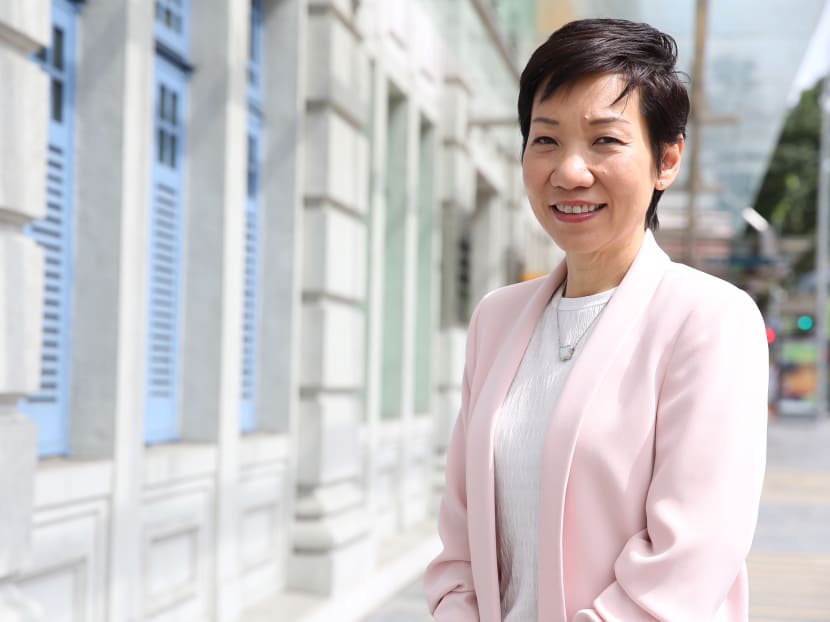Creating opportunities for mixing more important in fostering cohesive society: Grace Fu
SINGAPORE — Weighing in on a survey that found there was a class divide in Singapore, Minister for Culture, Community and Youth Grace Fu said it was natural for people to tend to socialise with those from the same background, and what matters more is that there are ample opportunities for mixing.

Minister for Culture, Community and Youth Grace Fu acknowledged that there was less diversity among those who live in private and public housing. Photo: Koh Mui Fong/TODAY
SINGAPORE — Weighing in on a survey that found there was a class divide in Singapore, Minister for Culture, Community and Youth Grace Fu said it was natural for people to tend to socialise with those from the same background, and what matters more is that there are ample opportunities for mixing.
Speaking to the media in an interview on Wednesday (Jan 17) to round up her ministry’s work last year, Ms Fu said it was “not unnatural” that individuals tend to mix more with certain groups of people such as their schoolmates, and her role is not to deliberately break up social groupings.
Rather, it is to make sure Singaporeans have opportunities to mix around through the arts, sports, and volunteering.
She noted that the same survey showed Singaporeans experience diversity in other aspects, such as having friends from other races and religious faiths, and working with colleagues of different ages.
“If you look at the results holistically, you find good diversity (in) our social network,” said Ms Fu.
In December, local think tank Institute of Policy Studies released findings of their survey on social ties and found that the social class divide among Singaporeans was more apparent than it seems. For instance, private housing dwellers tend to mix with people living in the same housing type, instead of those in public flats. Meanwhile, people from so-called “elite” schools tend to socialise with those who went to similar schools.
Ms Fu acknowledged though, that there was less diversity among those who live in private and public housing, for instance.
“Are we concerned? Yes, like all surveys, we watch these trends carefully. Are we alarmed? I would say no,” she said.
Elaborating on the diversity in social networks here, Ms Fu cited a running group that she is part of, made up of Singaporeans, non-citizens, residents from her constituency as well as those living elsewhere. Apart from running together once a week, they also participate in a community project once a year.
“So through social interest groups like this, we find that actually our social circles are being extended. We are able to make friends with people we would otherwise won’t normally meet. That’s an example of how we encourage sports participation and … arts participation, it allows people to really diversify their social circle,” she added.
And her ministry wants to encourage, facilitate and provide more such opportunities.
She cited some examples. A children’s art centre Artground was launched at Goodman Arts Centre to make the arts more accessible to young children aged 12 and below. Six new ActiveSG academies and clubs were launched to encourage children to take up sports while making friends with peers from different backgrounds. Outward Bound Singapore camps also “purposefully mix” Secondary 3 students from different schools.
Noting the MCCY’s focus on building a stronger, more cohesive society, and bringing people of diverse backgrounds together, Ms Fu pointed to imbalanced growth in the economy, a rise in nationalistic fervor, and extremist and exclusivist views on religion as challenges that could pull communities apart. Singapore is not immune to these challenges, she added.
While social mixing can help address the threat of religious extremism, such as Islamophobia, Ms Fu said such relationships have to be built up in phases.
At the basic level, Singaporeans of different backgrounds can be encouraged to come together to play soccer weekly, for instance. But going further, there should also be opportunities for them to have deep discussions and ask difficult questions about various topics, including religion.
To tackle religious extremism and terrorism, MCCY will also be expanding its Inter-Racial and Religious Confidence Circle network to reach out to religious organisations that are not part of the network. Her ministry also launched Broadening Religious or Racial Interaction through Dialogue and General Education or Bridge last year to create content that deepens the understanding of the different races and religion here. It will also provide a safe spaces for people to discuss religious issues.
Ms Fu said her ministry has always been looking into “potential fissures”, which range from race, religion, foreigners versus locals to social divides such as income inequality.
“I wouldn’t say that religious, terrorism, or religious extremism is the only cause that we need to be concerned with. But it still is an important one … (and) something that we are working very closely with (the Ministry of Home Affairs) to address these concerns.
“But we are not taking our eyes off the other divides that could potentially fracture the society,” she added.






